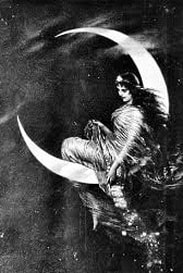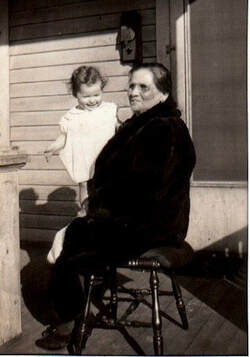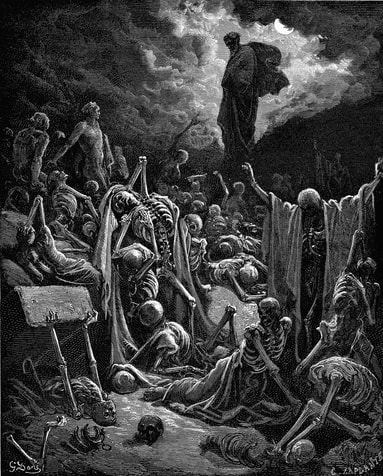
The man in the moon is a lady.
A lady in lipstick and curls.
The cow that jumped ovah
Cried, "Jumpin' Jehovah,
I think it's just one of the girls!"
Oh, her friends are the stars and the planets.
She sends the Big Dipper a kiss.
So don't ever offend her.
Remember her gender.
The man in the moon is a miss
from Mame, by Jerry Herman
*
Rosh Hodesh (Hebrew for beginning/head of the month) is the name for the first day
of every month in the Hebrew calendar. Since ancient times, each Rosh Hodesh --
each new moon — has been a special holiday, particularly for women. According to a midrash, God gave Rosh Hodesh to women as a monthly day of rest as a reward for their refusal to participate in the sin of the Golden Calf.
The new moon of the Hebrew month of Iyar is observed this year from sundown on Thursday, April 23 to sundown on Saturday, April 25. According to Rabbi Nachman of Bratslav, the name Iyar is an acronym for Ani Adonai Rofecha, ‘I am God your Healer’, and is a special month in which we can find healing and wholeness.
Oh, if only . .
Changing gears here . . .
*
I’m a superstitious Crone.
When I spill salt, I toss more salt over my left shoulder. When I hear bad — or even good news — I say, “P’tui, p’tui, p’tui.” Furthermore, I wear charms and amulets engraved with Hebrew blessings, sport red Kabbalah strings and hamsas to ward off the evil eye, wrap Buddhist prayer beads around my wrists to lessen anxiety and worry, along with carnelian stones to keep me grounded and foster courage. Also, I’m rarely without my blue sodalite bracelet dangling a charm of St. Michael the Archangel (Chief and commander of the heavenly hosts, deliver us from all evil by your gracious protection . . .) made by a Catholic friend, because why not? A Crone needs to cover her bases, especially in these dystopian times.
Which means I’m also open to other methods of outwitting goblins, fiends and
Lilith-look-alikes. Got incantations and spells to keep demonic shedim away? Email ‘em to me, ASAP. Know a golem who’s looking for work? Give him my home address. I come by this honestly, friends. When a black sock, stuffed with silver dollars went missing from its hiding place under the stove in my childhood home, Poppa insisted the gelt was stolen by a band of imps. Again, why not?
My grandmother, my Bubbie Rochel, was no slouch when it came to superstition, either. Many’s the night we sat on the porch swing, looking at the heavens while she filled my young head with stories of the women in her Russian shtetl, waiting on shpilkehs every month for the new moon. And how, during the healing month of Iyar, they boldly dispensed their folk remedies as needed.
“One Shabbos during Iyar,” my Bubbe whispered while the swing creaked, “Shmuel the tailor swallowed a little chicken bone and it caught (p’tui, p’tui, p’tui) in his throat. Terrible terrible, with the coughing, the choking noises. But Rivkah, such a clever wife, pulled the leg bone from the chicken, held in on Shmuel’s skull (she removed first, his yarmulke), and bim, bam, bom, Shmuel spit out the little bone and finished, thanks God, his dinner.”
“A chicken leg on his head?” I said.
“Of course, if Shmuel, instead, had been burning with fever, Rivkah would have run to the yard, found a black hen, shaved Shmuel’s head, put the hen on it, and left it there until, from the blood, the hen stuck. Then Rivkah would have run with Shmuel to the mikveh and waited while he stood in the water, up to his neck, until he felt faint and then she’d tell him, ‘Come out of the water already, Shmuley. Come sit. Rest.’”
“What if Shmuel was too weak from fever to run to the mikveh, Bubbe?”
“Then he eats an onion. If he’s still hot, he lets the rain of Iyar fall on his head or, even better, opens wide his mouth so the rain goes straight in. Of course, Osneleh, to recover from sickness takes, besides a clever wife, also mazel. Not everyone, when tsoris comes, has a chicken leg, a black hen or rain. Sometimes not even an onion.”
As a little girl, I chose to believe in Poppa’s imps and in Bubbe’s shtetl remedies. As a Crone, I know better, but the magic in these stories still charms me.
Now. When Bubbie wasn’t warning me against cutting my toenails on the new moon, she introduced me to tehenes, devotional prayers composed generations ago for use on Rosh Hodesh. Unlike classical Hebrew prayers created by men primarily for men, tehenes were written in Yiddish by women for women. They share the same yearnings, hopes and beliefs expressed in the men’s prayers, but tehenes are informal, conversational and intimately personal. They reflect the very real fears of shtetl women. The ever present threat of war and program, of famine and infant death. And though these fears are often personified by demons, imps and evil eyes — and though tehenes were written in a language few of us speak or understand — the honesty of their words transcends the differences in culture and language and can still touch us today.
The anonymous author of one tehene wrote:
Master of the World. Listen to my plea.
For I, a poor woman, want to reveal to you
all that is in my heart, just as a child confides in a father.
Send good angels to lead me on the right way.
May there be no tears in my eyes because of worry.
Illuminate my children's eyes through the study of your laws
and may they not forget what they have learned.
Protect my family from all harm.
From sickness, sorrow, mishap and hunger.
May we not have to be fed by others.
I beg you to listen.
Dispel the ominous fears of my heart.
Save me from the cold.
Protect me from thieves, from gossip and from the evil inclination.
Bring my family sustenance, an honorable livelihood, success and joy.
On this Rosh Hodesh, on this New Moon, shield us from darkness and give us light.
Inspired by tehenes written by our shtetl sisters, today’s women also write prayers in celebration of Rosh Hodesh and the new moon. Prayers to overcome the darkness. Prayers of hope and comfort that ease us as we grow older. Like these words, taken from Rabbi Vicki Hollander:
God who sees. Open our eyes to know we can come alive.
No matter how dark the world is, we can renew and blossom.
One who envisions, let us be as the shaked almond tree.
Let us blossom in the chill of winter.
Let us lift our branches to the sky defiantly, proudly, with grace.
Let us kiss the stars and hug the earth.
Let us stand despite wind and storm, heat and drought,
May we change in our seasons, aging with grace,
growing yet another ring,
a circle marking our live’s passages, etched in our bark.
Blu Greenberg, a rock-star feminist, writes that logic would suggest we celebrate the full moon. After all, that is when it is the most rich, the brightest, the most exuberant. Why not celebrate in the beauty of a full, round, beaming moon and in the safety of its glowing light? But then she answers her own question. Rosh Hodesh is tied to the peak of night darkness rather than to the peak of its light because the central message of Rosh Hodesh is that each new month is again a time for hope, optimism, renewal. Sounds good, but today, in April of 2020, my reservoir of hope and optimism is pretty much dry. Still, like all of you, I keep putting on my big girl pants.
And so, as big girls and boys with lots of time on our hands, we could consider the light of the newborn crescent moon as our guide toward personal renewal, too. If we can Kondo our closets, we can ‘declutter’ ourselves, right? Discard old habits, beliefs, attitudes, expectations, fears, behaviors that don’t fit anymore. Let go of the stuff that doesn’t bring us joy. Sound like a tall order? Agreed. But look at the new moon and take heart. She proves that change takes patience and tenacity. It comes little by little, in phases. But it comes. So let’s give ourselves permission to go easy. Travel light. And if amulets help us get there, why not?
*
Rosh Hodesh (Hebrew for beginning/head of the month) is the name for the first day
of every month in the Hebrew calendar. Since ancient times, each Rosh Hodesh --
each new moon — has been a special holiday, particularly for women. According to a midrash, God gave Rosh Hodesh to women as a monthly day of rest as a reward for their refusal to participate in the sin of the Golden Calf.
The new moon of the Hebrew month of Iyar is observed this year from sundown on Thursday, April 23 to sundown on Saturday, April 25. According to Rabbi Nachman of Bratslav, the name Iyar is an acronym for Ani Adonai Rofecha, ‘I am God your Healer’, and is a special month in which we can find healing and wholeness.
Oh, if only . .
Changing gears here . . .
*
I’m a superstitious Crone.
When I spill salt, I toss more salt over my left shoulder. When I hear bad — or even good news — I say, “P’tui, p’tui, p’tui.” Furthermore, I wear charms and amulets engraved with Hebrew blessings, sport red Kabbalah strings and hamsas to ward off the evil eye, wrap Buddhist prayer beads around my wrists to lessen anxiety and worry, along with carnelian stones to keep me grounded and foster courage. Also, I’m rarely without my blue sodalite bracelet dangling a charm of St. Michael the Archangel (Chief and commander of the heavenly hosts, deliver us from all evil by your gracious protection . . .) made by a Catholic friend, because why not? A Crone needs to cover her bases, especially in these dystopian times.
Which means I’m also open to other methods of outwitting goblins, fiends and
Lilith-look-alikes. Got incantations and spells to keep demonic shedim away? Email ‘em to me, ASAP. Know a golem who’s looking for work? Give him my home address. I come by this honestly, friends. When a black sock, stuffed with silver dollars went missing from its hiding place under the stove in my childhood home, Poppa insisted the gelt was stolen by a band of imps. Again, why not?
My grandmother, my Bubbie Rochel, was no slouch when it came to superstition, either. Many’s the night we sat on the porch swing, looking at the heavens while she filled my young head with stories of the women in her Russian shtetl, waiting on shpilkehs every month for the new moon. And how, during the healing month of Iyar, they boldly dispensed their folk remedies as needed.
“One Shabbos during Iyar,” my Bubbe whispered while the swing creaked, “Shmuel the tailor swallowed a little chicken bone and it caught (p’tui, p’tui, p’tui) in his throat. Terrible terrible, with the coughing, the choking noises. But Rivkah, such a clever wife, pulled the leg bone from the chicken, held in on Shmuel’s skull (she removed first, his yarmulke), and bim, bam, bom, Shmuel spit out the little bone and finished, thanks God, his dinner.”
“A chicken leg on his head?” I said.
“Of course, if Shmuel, instead, had been burning with fever, Rivkah would have run to the yard, found a black hen, shaved Shmuel’s head, put the hen on it, and left it there until, from the blood, the hen stuck. Then Rivkah would have run with Shmuel to the mikveh and waited while he stood in the water, up to his neck, until he felt faint and then she’d tell him, ‘Come out of the water already, Shmuley. Come sit. Rest.’”
“What if Shmuel was too weak from fever to run to the mikveh, Bubbe?”
“Then he eats an onion. If he’s still hot, he lets the rain of Iyar fall on his head or, even better, opens wide his mouth so the rain goes straight in. Of course, Osneleh, to recover from sickness takes, besides a clever wife, also mazel. Not everyone, when tsoris comes, has a chicken leg, a black hen or rain. Sometimes not even an onion.”
As a little girl, I chose to believe in Poppa’s imps and in Bubbe’s shtetl remedies. As a Crone, I know better, but the magic in these stories still charms me.
Now. When Bubbie wasn’t warning me against cutting my toenails on the new moon, she introduced me to tehenes, devotional prayers composed generations ago for use on Rosh Hodesh. Unlike classical Hebrew prayers created by men primarily for men, tehenes were written in Yiddish by women for women. They share the same yearnings, hopes and beliefs expressed in the men’s prayers, but tehenes are informal, conversational and intimately personal. They reflect the very real fears of shtetl women. The ever present threat of war and program, of famine and infant death. And though these fears are often personified by demons, imps and evil eyes — and though tehenes were written in a language few of us speak or understand — the honesty of their words transcends the differences in culture and language and can still touch us today.
The anonymous author of one tehene wrote:
Master of the World. Listen to my plea.
For I, a poor woman, want to reveal to you
all that is in my heart, just as a child confides in a father.
Send good angels to lead me on the right way.
May there be no tears in my eyes because of worry.
Illuminate my children's eyes through the study of your laws
and may they not forget what they have learned.
Protect my family from all harm.
From sickness, sorrow, mishap and hunger.
May we not have to be fed by others.
I beg you to listen.
Dispel the ominous fears of my heart.
Save me from the cold.
Protect me from thieves, from gossip and from the evil inclination.
Bring my family sustenance, an honorable livelihood, success and joy.
On this Rosh Hodesh, on this New Moon, shield us from darkness and give us light.
Inspired by tehenes written by our shtetl sisters, today’s women also write prayers in celebration of Rosh Hodesh and the new moon. Prayers to overcome the darkness. Prayers of hope and comfort that ease us as we grow older. Like these words, taken from Rabbi Vicki Hollander:
God who sees. Open our eyes to know we can come alive.
No matter how dark the world is, we can renew and blossom.
One who envisions, let us be as the shaked almond tree.
Let us blossom in the chill of winter.
Let us lift our branches to the sky defiantly, proudly, with grace.
Let us kiss the stars and hug the earth.
Let us stand despite wind and storm, heat and drought,
May we change in our seasons, aging with grace,
growing yet another ring,
a circle marking our live’s passages, etched in our bark.
Blu Greenberg, a rock-star feminist, writes that logic would suggest we celebrate the full moon. After all, that is when it is the most rich, the brightest, the most exuberant. Why not celebrate in the beauty of a full, round, beaming moon and in the safety of its glowing light? But then she answers her own question. Rosh Hodesh is tied to the peak of night darkness rather than to the peak of its light because the central message of Rosh Hodesh is that each new month is again a time for hope, optimism, renewal. Sounds good, but today, in April of 2020, my reservoir of hope and optimism is pretty much dry. Still, like all of you, I keep putting on my big girl pants.
And so, as big girls and boys with lots of time on our hands, we could consider the light of the newborn crescent moon as our guide toward personal renewal, too. If we can Kondo our closets, we can ‘declutter’ ourselves, right? Discard old habits, beliefs, attitudes, expectations, fears, behaviors that don’t fit anymore. Let go of the stuff that doesn’t bring us joy. Sound like a tall order? Agreed. But look at the new moon and take heart. She proves that change takes patience and tenacity. It comes little by little, in phases. But it comes. So let’s give ourselves permission to go easy. Travel light. And if amulets help us get there, why not?
*

In this new month of Iyar
and in all the months to come . . .
May you feel safe and protected.
May you feel content.
May you feel healthy and strong.
May you live with ease.
Amen.
,My Bubbie Rochel and me on her porch,
long before I became a Crone.

 RSS Feed
RSS Feed
